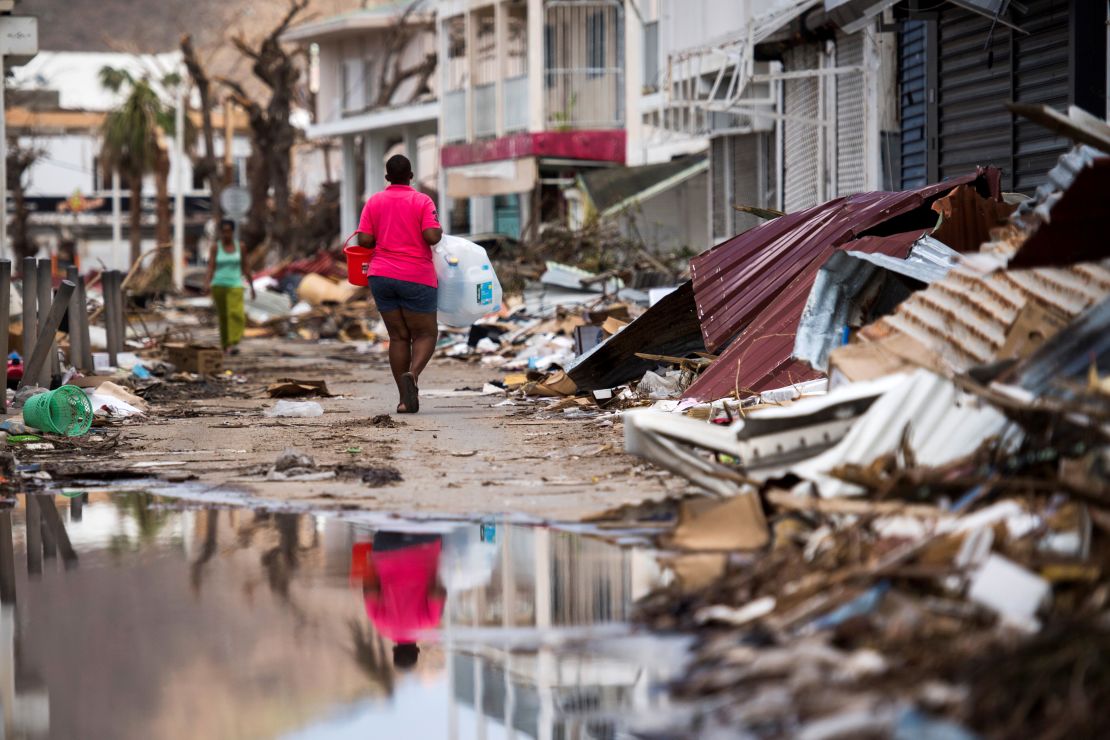Story highlights
NEW: UK Foreign Secretary Boris Johnson visits British Virgin Islands
Reports of looting, but also stories of people helping others with limited supply
Residents of far-flung Caribbean territories and former colonies devastated by Hurricane Irma last week have a message for their longtime rulers: Don’t forget us.
Across once-lush islands now being compared to a “nuclear landscape,” many residents find themselves in darkness, as power remains out, – and they’re increasingly worried about dwindling food and water supplies.
In the storm’s aftermath a volatile situation with ongoing challenges has forced thousands of people to fend for themselves.
“You listen to the radio. You call. But nobody comes,” said Leroy Webb, a resident of St. Maarten, which is the Dutch part of the island. The French side of the island is St. Martin.
“I even don’t know how long it will take before people here get food. This morning, my wife was making soup with just two potatoes in it. We have nothing to eat,” he told CNN affiliate RTL Netherlands.
Along with voicing feelings of abandonment, island residents spoke of widespread scarcity, the generosity of neighbors, looting and machete-armed volunteers standing guard over properties.
Hurricane Irma struck a patchwork of independent island nations and territories in various forms of association with France, the Netherlands, the US and the UK and killed at least 44 people in the Caribbean.
“This is the most extraordinary scene of decimation and devastation that many people have witnessed in their lives,” UK Foreign Secretary Boris Johnson told CNN Wednesday as he toured Tortola, the largest of the British Virgin Islands.
“It really is a nuclear landscape.”
US and Europe step up assistance
US and European governments have responded to the disaster by stepping up support for their territories and former colonies, sending ships with food, water, medical supplies and aid experts.
The US Federal Emergency Management Agency said it has dispatched nearly 443,000 meals, 270,000 liters of water and other supplies to St. Thomas and St. John.
The US Army Corps of Engineers is assessing the main hospital on St. Thomas, according to the defense department. The corps is also helping ship a 750-kilowatt generator to St. Thomas to restart the island’s power plant.
Still, many residents feel overlooked.
“We’re just waiting,” said Mike Simmonds, whose St. Thomas home since 1985 sustained severe damage. “I wouldn’t say (for) help. One thing I can say for the weather report … whenever there’s a storm in the area, they always seem to jump over the Virgin Islands before the storm hits. It’s always, ‘Is it going to hit Florida? Is it going to North Carolina?’ I’m like, ‘Hello. It didn’t reach us yet. Tell us what to do.’”
‘We do feel forgotten’
Anne Bequette, a wedding photographer in St. John, told CNN Wednesday that the smallest of the US Virgin islands will take years to rebuild.
“I understand that in Florida all are hurting as well and my heart goes out to all of those affected,” she said. “But I’ve heard from some in the States that they’re looking at a few weeks without power. We’re looking at next year.”
The US territory has been largely abandoned in the aftermath of the deadly storm, she said.
“We do feel forgotten,” she said. “We’re being completely overlooked. I feel like St. John is just a dot on the map to some people. There are so many lives down here that need help from you guys and from the States.”
In the absence of federal emergency assistance, Bequette said, locals have banded together to clear roads and undertake other post-storm tasks.
“We need food. We need water. We need propane for generators. We need tons of resources and medical supplies,” she said. “There are women with broken hips being turned away from the clinic because they’re not a life-or-death situation right now.”
Adam Marlatt, the founder of Global Disaster Immediate Response Team, had a stark assessment speaking from St. John, which is part of the US Virgin Islands.
“The biggest problem,” he said, was “not just debris but getting people off the island because there’s no sustainable option for them.”
He said virtually 100% of the power infrastructure is damaged or destroyed and that every power line over the roads was down. Marlatt said plans to restore normalcy hadn’t begun yet because they were busy trying to chainsaw through and search for people who may be stuck inside their homes.
From paradise to hell
European politicians, including French President Emmanuel Macron, visited the overseas territories this week. Macron condemned reports of looting and vowed to restore order by deploying 2,000 security personnel to street patrols on St. Martin. He also offered assurances that power will be restored, running water will return and schools will reopen in the coming weeks.
European governments stepped up their support for their territories and former colonies in the Caribbean that were devastated by Hurricane Irma last week, with the French President and the King of the Netherlands both traveling to the region.
Emmanuel Macron will leave Monday night for the Caribbean island of St. Martin to show his support for the relief effort, French Interior Minister Gerard Collomb said on Sunday.
Dutch King Willem-Alexander has already arrived in Curacao where he visited injured evacuees, and is scheduled to visit St. Maarten, St. Eustatius and Saba on Monday, Karel van Oosterom, the Dutch permanent representative to the United Nations, said in a tweet.
But to those who fled the conditions there, it sounded like wishful thinking.
“It’s really like the end of the world over there right now,” said Frances Bradley-Vilier, who moved to St. Maarten three years ago. “I’m not trying to be dramatic but there’s no water, there’s no electricity, there’s no way to communicate with each other.”
Three days before Irma made landfall, Bradley-Vilier got married to Dominique Vilier, who is from the island. Their newlywed bliss was short-lived.
They had made their home together in St. Maarten in recent years, but it didn’t take long for them to realize they had to leave after the storm.
Dominique Vilier said people were robbing others for whatever they have. Government patrols were overwhelmed by people on the streets with guns, he said. CNN has been unable to verify claims of looting and armed citizens on the streets.
The night before he left, Vilier said two people tried to break into his house “and I had to scare them off.”
“That’s when I decided I have to leave,” he said. “It’s madness.”
They were able to get to Puerto Rico, but hope to return to the island.
“St. Maarten will always be home. This is where I’m from. But it won’t be the same,” Vilier said. “It just takes a couple hours, from paradise to hell.”
We had to ‘figure out a way to survive’
Kaiann Macleay and her husband had been at a St. Martin resort when Hurricane Irma struck. After the storm subsided, they went outside and saw the debris from homes, resorts and businesses.
She said that some people were snatching up anything they could get their hands on, from necessities like gas to luxury goods.

Her husband, Lachlan Macleay and other guests formed a volunteer patrol armed with machetes and kitchen knives, and they took turns keeping night watch over the property.
“It just felt like you had to call yourself to action and do it because no one was gonna protect us other than ourselves,” he told CNN’s Erin Burnett. “We had to rise to the occasion and band together.”
It quickly became apparent “assistance was not arriving,” his wife added. “We had to prepare to take care of ourselves and figure out a way to survive.”
They were later able to get to Puerto Rico.
In the time of scarcity, community supports one another
While the devastation brought fear and chaos, it also brought a sense of community among survivors who shared what resources they had left.
One woman who lost her Philipsburg, St. Maarten, home, said the neighbors were helping her.
“We don’t have food. We are getting through because the neighbor there, they cook. You know, everybody shares. Everybody comes together and they help us,” one woman told TeleCuraçao.
In St. Thomas, which is part of the US Virgin Islands, Julien Alleyne survived Irma by hiding in his bathtub for 18 hours. He said he was fortunate not to run out of food, thanks to the kindness of others.
“We are lucky to have friends and family nearby that had plenty of food and water. I’m thinking about the people who can’t rely on the people around them, getting supplies. It’s hard. There’s lines everywhere, gas stations, grocery stores,” he told CNN, after evacuating to St. Croix.
“I want to bring awareness to my islands. We’re in a desperate situation here.”
CNN’s Ben Westcott contributed to this report.




















